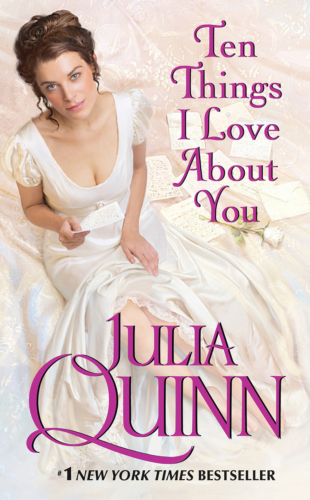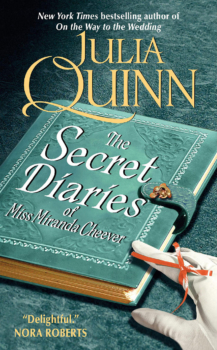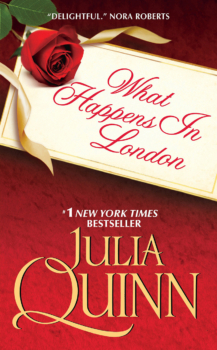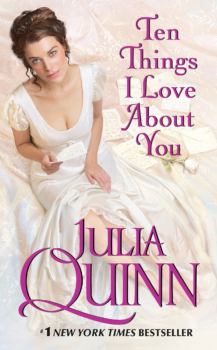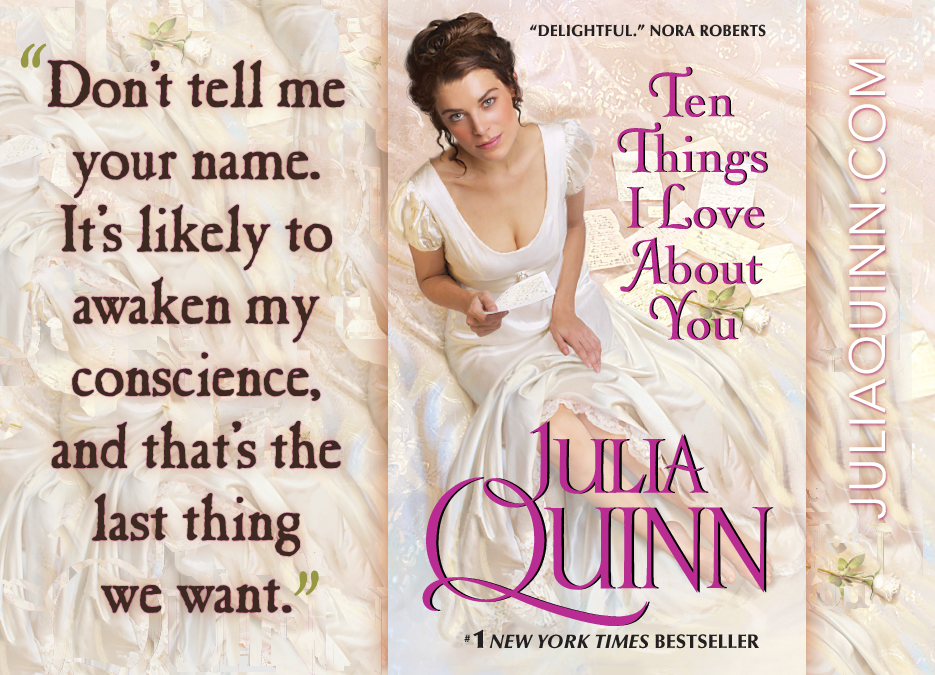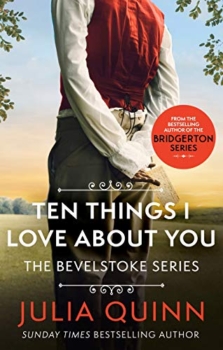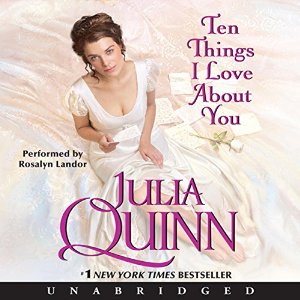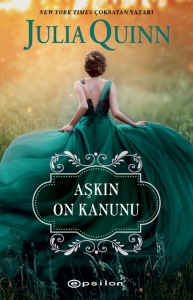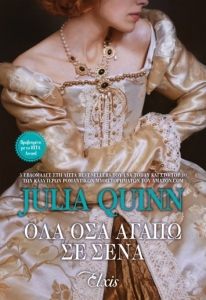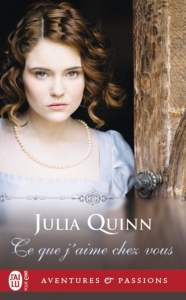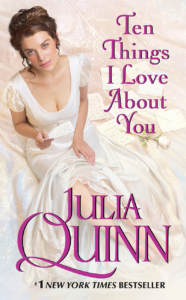Ten Things I Love About You
Book 3 in the
Bevelstoke Series
Ten Things You Should Know About This Book:
1. Sebastian Grey is a devilishly handsome rogue with a secret.
2. Annabel Winslow’s family voted her The Winslow Most Likely to Speak Her Mind AND The Winslow Most Likely to Fall Asleep in Church.
3. Sebastian’s uncle is the Earl of Newbury, and if he dies without siring an heir, Sebastian inherits everything.
4. Lord Newbury detests Sebastian and will stop at nothing to prevent this from happening.
5. Lord Newbury has decided that Annabel is the answer to all of his problems.
6. Annabel does not want to marry Lord Newbury, especially when she finds out he once romanced her grandmother.
7. is shocking, 8. is delicious, 9. is downright wicked, all of which leads the way to
10. Happily. Ever. After.
A perennial New York Times bestselling author, whose books have reached as high as #1, Julia Quinn returns with Ten Things I Love About You, another clever, witty, and delightful historical romance.
 Start Reading Now
Start Reading Now
 Explore Inside this Story
Explore Inside this Story

Books in this series:
Find out more about the Bevelstoke Series →
-
-
Quinn-tessential Quote
"Don't tell me your name. It's likely to awaken my conscience, and that's the last thing we want."
-
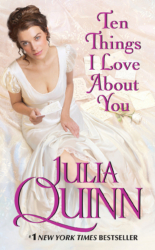
Inside the Story:
JQ’s Author Notes- Sebastian first appeared in What Happens in London. He kind of stole the show, so it was pretty clear to me he'd need his own book. And in fact, I've given him another book: the graphic novel adaptation of Miss Butterworth and the Mad Baron!
- Sebastian and Annabel meet at Lady Trowbridge’s party in Hampstead--the same party at which Daphne and Simon share their first kiss in The Duke and I. (Not the same year, though; I’ve decided Lady Trowbridge’s party is an annual event.)
- In What Happens in London, Harry Valentine had to leave The Magic Flute after the first act, and Olivia had to miss the performance entirely, so I was happy to give them an opportunity to finally see the opera.
- I have often been asked if I plan to write a paranormal romance. The answer is no, but I will confess to pride and amusement at my having managed to use the word, "undead" in this novel.
- Lady Twombley is the former Cressida Cowper, who appeared as the "mean girl" in The Viscount Who Loved Me and Romancing Mr. Bridgerton.
- At the Hartside Ball, Annabel dances with a veritable compendium of characters from my previous books: Nigel Berbrooke (from The Duke and I), Mr. Albansdale (who married Felicity Featherington), Neville Berbrooke (from On the Way to the Wedding), Mr. Cavender (the villain in An Offer from a Gentleman), Prince Alexei (from What Happens in London), Sir Harry Valentine (the hero from What Happens in London), and Gareth St. Clair (the hero from It's in His Kiss). Except for Harry, none of these men have anything to do with the plot of Ten Things I Love About You. But I needed to list the men Annabel danced with, and I thought I might as well use characters we’d seen before.
- I can't skip stones. I've always wished that I could.
- In the epilogue, Sebastian says that if he takes Annabel's advice he will "go down in a flaming pit of ruin." I said the exact same thing to my husband, for the exact same reason.
- Any Spinal Tap fans out there? This book goes to eleven.

Bonus Features
Enjoy an Excerpt
from
Ten Things I Love About You
Prologue
A few years ago
He couldn’t sleep.
This was nothing new. One would think he’d be used to it by now.
But no, each night Sebastian Grey closed his eyes with every expectation of falling asleep. Because why shouldn’t he? He was a perfectly healthy fellow, perfectly happy, perfectly sane. There was no reason why he shouldn’t be able to sleep.
But he couldn’t.
It didn’t happen all the time. Sometimes —and he had no idea why it happened or it didn’t— he lay his head on his pillow and fell almost instantly into blissful slumber. The rest of the time, he tossed, turned, got up to read, drank tea, tossed, turned some more, sat up and looked out the window, tossed, turned, played darts, tossed, turned, and then finally gave up and watched the sunrise.
He’d seen a lot of sunrises. In fact, Sebastian now considered himself something of an expert on the sunrises of the British Isles.
Inevitably exhaustion would set in, and sometime after dawn he would fall asleep, on his bed or in his chair or a few unpleasant times with his face pressed up against the glass. This didn’t happen every day, but often enough so that he’d gained a reputation as a slugabed, which frankly amused him. There was nothing he liked so much as a crisp and energetic morning, and certainly no meal could ever be as fulfilling as a robust English breakfast.
And so he trained himself to live with his affliction as best he could. He’d got into the habit of taking breakfast at the home of his cousin Harry, in part because Harry’s housekeeper laid a damned fine meal, but also because it meant that Harry now expected him to show up. Which meant that nine times out of ten, Sebastian had to show up. Which meant that he could not allow himself to pass out at half seven every morning. Which meant that he was more tired than usual the following night. Which meant that when he crawled into bed and closed his eyes, he would fall asleep more easily.
In theory.
No, that wasn’t fair, he thought. No need to turn his sarcasm inward. His grand plan didn’t work perfectly, but it worked some. He was sleeping a little better. Just not tonight.
Sebastian got up and walked to the window, resting his forehead against the pane. It was cold outside, and the icy chill pressed up against him through the glass. He liked the sensation. It was big. Grand. The sort of vivid moment that reminded him of his humanity. He was cold, therefore he must be alive. He was cold, therefore he must not be invincible. He was cold, therefore—
He stood back and let out a disgusted snort. He was cold, therefore he was cold. There wasn’t really much more to it.
He was surprised it wasn’t raining. When he’d arrived home that night it had looked like rain. He’d grown uncommonly good at predicting the weather while on the Continent.
It would probably start raining soon.
He wandered back to the center of his room and yawned. Maybe he should read. That sometimes made him sleepy. Of course, being sleepy wasn’t the issue. He could be dead sleepy and still not sleep. He’d close his eyes, tuck his pillow just the right way, and yet—
Nothing.
He’d just lie there, waiting, waiting, waiting. He’d try to empty his mind, because surely that was what was needed. A blank canvas. A clean slate. If he could embrace absolute nothingness, then he would fall asleep. He was sure of it.
But it didn’t work. Because every time Sebastian Grey tried to embrace nothingness, the war came back and embraced him.
He saw it. Felt it. Again. All those things for which frankly, once had been more than enough.
And so he opened his eyes. Because then all he saw was his rather ordinary bedchamber, with its rather ordinary bed. The quilt was green, the curtains gold. His desk was wood.
It was quiet, too. During the day there were the regular sounds of the city, but at night this part of town almost always fell silent. It was amazing, really, to actually enjoy silence. To listen to the wind and maybe the song of bird without always keeping one ear perked for footfall, or gunshot. Or worse.
One would think he’d be able to sleep in such a happy quiet.
He yawned again. Maybe he’d read. He’d picked a few books from Harry’s collection this afternoon. There hadn’t been much to choose from; Harry liked to read in French or Russian, and while Sebastian knew both of those languages as well (their shared maternal grandmother had insisted upon it), they did not come as naturally to him as they did to Harry. Reading in anything but English was work, and Seb just wanted to be entertained.
Was that too much to expect from a book?
If he were to write a book, there would be excitement. Lives would be lost, but not too many. And never any of the main characters. That would be much too depressing.
There ought to be a romance, too. And danger. Danger was good.
Maybe a little of the exotic, but not too much. Sebastian suspected that most authors did not do their research properly. He’d read a novel recently which took place in an Arabian harem. And while Seb definitely found the idea of a harem interesting—
Very interesting.
—he couldn’t imagine that the author had got any of the details right. He liked an adventure as best as the next man, but even he found it difficult to believe that the plucky English heroine managed to escape by hanging a snake out the window and sliding down to safety.
To add insult to injury, the author had not even indicated what sort of snake she’d used.
Really, he could do better.
If he wrote a book, he would set it in England. There would be no snakes.
And the hero would not be some pissy little dandy, concerned only with the cut of his waistcoat. If he wrote a book, the hero would damn well be heroic.
But with a mysterious past. Just to keep things interesting.
There would have to be a heroine, too. He liked women. He could write about one. What would he name her? Something ordinary. Joan, maybe. No, that sounded too fierce. Mary? Anne?
Yes, Anne. He liked Anne. It had a nice definite sound to it. But no one would call her Anne. If he were to write a book, his heroine would be adrift, without family. There would be no one to use her Christian name. He needed a good surname. Something easy to pronounce. Something pleasant.
Sainsbury.
He paused, testing it out in his mind. Sainsbury. For some reason it reminded him of cheese.
That was good. He liked cheese.
Anne Sainsbury. It was a good name. Anne Sainsbury. Miss Sainsbury. Miss Sainsbury and…
And what?
What about that hero? Ought he to have a career? Certainly Sebastian knew enough about the ways of nobility to paint an accurate portrait of an indolent lord.
But that was boring. If he were to write a book, it would have to be a cracking good story.
He could make the hero a military man. He certainly knew about that. A major, perhaps? Miss Sainsbury and the Mysterious Major?
Gad no. Enough with the alliteration. Even he found it a bit too precious.
A general? No, generals were too busy. And there really weren’t that many of them running around. If he were going to get that rarefied he might as well throw in a duke or two.
What about a colonel? High in the ranks, so he would have authority and power. He could be from a good family, someone with money, but not too much of it. A younger son. Younger sons had to make their way in the world.
Miss Sainsbury and the Mysterious Colonel. Yes, if he were to write a book, that’s what he would call it.
But he wasn’t going to write a book. He yawned. When would he find the time? He looked at his small desk, utterly empty save for a cup of cold tea. Or the paper?
The sun was already starting to come up. He ought to crawl back into bed. He could probably get a few hours of sleep before he had to get up and head over to Harry’s for breakfast.
He looked over at the window, where the slanted light of dawn was rippling through the glass.
He paused. He liked the sound of that.
The slanted light of dawn was rippling through the glass.
No, that was unclear. For all anyone knew, he could be talking about a brandy snifter.
The slanted light of dawn was rippling through the windowpane.
That was good. But it needed a little something more.
The slanted light of dawn was rippling through the windowpane, and Miss Anne Sainsbury was huddled beneath her thin blanket, wondering, as she often did, where she would find money for her next meal.
That was really good. Even he wanted to know what happened to Miss Sainsbury, and he was making it up.
Sebastian chewed on his lower lip. Maybe he should write this down. And give her a dog.
He sat at his desk. Paper. He needed paper. And ink. There had to be some in his desk drawers.
The slanted light of dawn was rippling through the windowpane, and Miss Anne Sainsbury huddled beneath her threadbare blanket, wondering as she often did, how she would find money for her next meal. She looked down at her faithful collie, lying quietly on the rug by her bed, and she knew that the time had come for her to make a momentous decision. The lives of her brothers and sisters depended upon it.
Look at that. It was an entire paragraph. And it had taken him no time at all.
Sebastian looked up, back at the window. The slanted light of dawn was still rippling through the glass.
The slanted light of dawn was rippling through the glass, and Sebastian Grey was happy.
Chapter One
Mayfair, London
Spring 1822
The key to a successful marriage,” Lord Vickers pontificated, “is to stay out of the way of one’s wife.”
Such a statement would normally have little bearing on the life and fortunes of Miss Annabel Winslow, but there were ten things that made Lord Vickers’ pronouncement hit painfully close to her heart.
One: Lord Vickers was her maternal grandfather, which pertained to Two: the wife in question was her grandmother who Three: had recently decided to pluck Annabel from her quiet happy life in Gloucestershire and, in her words: “clean her up and get her married.”
Of equal importance was Four: Lord Vickers was speaking to Lord Newbury, who Five: had once been married himself, apparently successfully, but Six: his wife had died and now he was a widower and Seven: his son had died the year prior, without a son of his own.
Which meant that Seven: Lord Newbury was looking for a new wife and Eight: he rather thought an alliance with Vickers was just the thing and Nine: he had his eye on Annabel because Ten: she had big hips.
Oh, blast. Had that been two sevens?
Annabel sighed, since that was the closest she was permitted to slumping in her seat. It didn’t really signify that there were eleven items instead of ten. Her hips were her hips, and Lord Newbury was presently determining if his next heir ought to spend nine months cradled between them.
“Oldest of eight, you say,” Lord Newbury murmured, eyeing her thoughtfully.
Thoughtfully? That could not be the correct adjective. He appeared about ready to lick his lips.
Annabel looked over at her cousin, Lady Louisa McCann, with a queasy expression. Louisa had come by for an afternoon visit, and they had been quite enjoying themselves before Lord Newbury had made his unexpected entrance. Louisa’s face was perfectly placid, as it always was in social settings, but Annabel saw her eyes widen with sympathy.
If Louisa, whose manner and bearing were consistently correct no matter the occasion, could not keep her horror off her face, then Annabel was in very big trouble, indeed.
“And,” Lord Vickers said with pride, “every one of them was born healthy and strong.” He lifted his glass in a silent toast to his eldest daughter, the fecund Frances Vickers Winslow, who, Annabel could not help but recall, he usually referred to as That Fool who married That Damned Fool.
Lord Vickers had not been pleased when his daughter had married a country gentleman of limited means. As far as Annabel knew, he had never revised that opinion.
Louisa’s mother, on the other hand, had wed the younger son of the Duke of Fenniwick a mere three months before the elder son of the Duke of Fenniwick had taken a stupid jump on an ill-trained stallion and broken his noble neck. It had been, in the words of Lord Vickers, “Damned good timing.”
For Louisa’s mother, that was; not for the dead heir. Or the horse.
It was not surprising that the Annabel and Louisa had crossed paths only rarely before this spring. The Winslows, with their copious progeny squeezed into a too small house, had little in common with the McCanns, who, when they weren’t in residence at their palatial London mansion, made their home in an ancient castle just over the Scottish border.
“Annabel’s father was one of ten,” Lord Vickers said.
Annabel turned her head to look at him more carefully. It was the closest her grandfather had ever come to an actual compliment toward her father, God rest his soul.
“Really?” Lord Newbury asked, looking at Annabel with glintier eyes than ever. Annabel sucked in her lips, clasped her hands together in her lap, and wondered what she might to do give off the air of being infertile.
“And of course we have seven,” Lord Vickers said, waving his hand through the air in the modest way men do when they are really not being modest at all.
“Didn’t stay out of Lady Vickers’s way all the time, then,” Lord Newbury chortled.
Annabel swallowed. When Newbury chortled, or really, when he moved in any way, his jowls seemed to flap and jiggle. It was an awful sight, reminiscent of that calf foot jelly the housekeeper used to force on her when she was ill. Truly, enough to put a young lady off her food.
She tried to determine how long one would have to go without nutrients to significantly reduce the size of one’s hips, preferably to a width deemed unacceptable for childbearing.
“Think about it,” Lord Vickers said, giving his old friend a genial slap on the back.
“Oh, I’m thinking,” Lord Newbury said. He turned toward Annabel, his pale blue eyes alight with interest. “I am definitely thinking.”
“Thinking is overrated,” announced Lady Vickers. She lifted a glass of sherry in salute to no one in particular and drank it.
“Forgot you were there, Margaret,” Lord Newbury said.
“I never forget,” grumbled Lord Vickers.
“I speak of gentlemen, of course,” Lady Vickers said, holding out her glass to whichever gentleman might reach it first to refill. “A lady must always be thinking.”
“That’s where we disagree,” said Newbury. “My own Margaret kept her thoughts to herself. We had a splendid union.”
“Stayed out of your way, did she?” Lord Vickers said.
“As I said, it was a splendid union.”
Annabel looked at Louisa, sitting so properly in the chair next to her. Her cousin was a wisp of a thing, with slender shoulders, light brown hair and eyes of the palest green. Annabel always thought she looked like a bit of a monster next to her. Her own hair was dark and wavy, her skin the sort that would tan if she allowed herself too much time in the sun, and her figure had been attracting unwanted attention since her twelfth summer.
But never –never– had attentions been any less wanted than they were right now, with Lord Newbury staring at her like a sugared treat.
Annabel sat quietly, trying to emulate Louisa and not allow any of her thoughts to show on her face. Her grandmother was forever scolding her for being too expressive. “For the love of God,” was a familiar refrain. “Stop smiling as if you know something. Gentleman don’t want a lady who knows things. Not as a wife, anyway.”
At this point Lady Vickers usually took a drink and added, “You can know lots of things after you’re married. Preferably with a gentleman other than your husband.”
If Annabel hadn’t known things before, she certainly did now. Like the fact that at least three of the Vickers offspring were probably not Vickerses. Her grandmother, Annabel was coming to realize, had, in addition to a remarkably blasphemous vocabulary, a rather fluid view on morality.
Gloucestershire was beginning to seem like a dream. Everything in London was so… shiny. Not literally, of course. In truth, everything in London was rather gray, dusted over by a thin sheen of soot and dirt. Annabel wasn’t really sure why “shiny” was the word that had come to mind. Perhaps it was because nothing seemed simple. Definitely not straightforward. And maybe even a little slippery.
She found herself longing for a tall glass of milk, as if something so fresh and wholesome might restore her sense of balance. She’d never thought herself particularly prim, and heaven knew that she was the Winslow most likely to fall asleep in church, but every day in the capital seemed to bring yet another shock, another moment that left her slack-jawed and confused.
A month she’d been here now. A month! And still she felt as if she were tiptoeing along, never quite sure if she was doing or saying the right thing.
She hated that.
At home she was certain. She wasn’t always right, but she was almost always certain. In London the rules were different. And worse, everyone knew everyone else. And if they didn’t, they knew about them. It was as if all the ton shared some secret history that Annabel was not privy to. Every conversation held an undercurrent, a deeper, more subtle meaning. And Annabel, who in addition to being the Winslow most likely to fall asleep in church was the Winslow most likely to speak her mind, felt she could not say a thing, for fear of making offense.
Or embarrassing herself.
Or embarrassing someone else.
She could not bear the thought. She simply could not bear the thought that she might somehow prove to her grandfather that her mother had indeed been a fool and her father had been a damned fool and that she was the damnedest fool of them all.
There were a thousand ways to make an idiot of oneself, with new opportunities arising every day. It was exhausting trying to avoid them all.
Annabel stood and curtsied when the Earl of Newbury took his leave, trying not to notice when his eyes lingered on her bosom. Her grandfather exited the room along with him, leaving her alone with Louisa, their grandmother, and a decanter of sherry.
“Won’t your mother be pleased,” Lady Vickers announced.
“About what, ma’am?” Annabel asked.
Her grandmother gave her a rather jaded look, with a tinge of incredulity and a twist of ennui. “The earl. When I agreed to take you in I never dreamed we might land anything above a baron. What good luck for you he’s desperate.”
Annabel smiled wryly. How lovely to be the object of desperation.
“Sherry?” her grandmother offered.
Annabel shook her head.
“Louisa?” Lady Vickers cocked her head toward her other granddaughter, who gave her head an immediate and negative shake.
“He’s not much to look at, that’s true,” Lady Vickers said, “but he was handsome enough when he was young, so your children won’t be ugly.”
“That’s nice,” Annabel said weakly.
“Several of my friends set their caps for him, but he had his eye on Margaret Kitson.”
“Your friends,” Annabel murmured. Her grandmother’s contemporaries had wanted to marry Lord Newbury. Her grandmother’s contemporaries had wanted to marry the man who most likely wanted to marry her.
Dear God.
“And he’ll die soon,” her grandmother continued. “You couldn’t hope for more.”
“I think I will have that sherry,” Annabel announced.
“Annabel,” Louisa said with a gasp, giving her a what-are-you-doing glance.
Lady Vickers nodded approvingly and poured her a glass. “Don’t tell your grandfather,” she said, handing it over. “He doesn’t approve of spirits for ladies under the age of thirty.”
Annabel took a large swallow. It went down her throat in a hot rush, but somehow she didn’t choke. She’d never been given sherry at home, at least not before supper. But here, now, she needed fortification.
“Lady Vickers,” came the voice of the butler, “you had asked me to remind you when it was time to leave for Mrs. Marston’s gathering.”
“Oh, right,” Lady Vickers said, groaning as she rose to her feet. “She’s a tedious old windbag, but she does lay a nice table.”
Annabel and Louisa stood as their grandmother left the room, and then, as soon as she was gone, they sank back down and Louisa said, “What happened while I was gone?”
Annabel sighed weakly. “I assume you refer to Lord Newbury?”
“I was in Brighton for only four days.” Louisa cast a quick glance at the door, making sure that no one was about, and then resumed in an urgent whisper, “And now he wants to marry you?”
“He hasn’t said as much,” Annabel replied, more out of wishful thinking than anything else. Based upon Lord Newbury’s attentions toward her these last four days, he’d be off to Canterbury to obtain a special license by the week’s end.
“Do you know his history?” Louisa asked.
“I think so,” Annabel replied. “Some of it.” Certainly not as much as Louisa would. Louisa was already on her second London season, and more to the point, she had been born to this world. Annabel’s pedigree might have included a grandfather who was a viscount, but she was a country gentleman’s daughter, through and through. Louisa, on the other hand, had spent every spring and summer of her life in London. Her mother –Annabel’s aunt Joan– had passed away several years earlier, but the Duke of Fenniwick had several sisters, all of whom held prominent positions in society. Louisa may have been shy, she may have been the last person anyone would expect to spread gossip and rumors, but she knew everything.
“He’s desperate for a wife,” Louisa said.
Annabel gave what she hoped was a self-deprecating shrug. “I’m rather desperate for a husband myself.”
“Not that desperate.”
Annabel did not contradict, but the truth was, if she didn’t marry well and soon, heaven only knew what would become of her family. They had never had a lot, but when her father had been alive, they’d always managed to make do. She wasn’t sure how they had afforded the tuition to send all four of her brothers to school, but they were all where they should be–at Eton, receiving a gentleman’s education. Annabel would not be responsible for their having to leave.
“His wife died, oh, I’m not sure how many years ago,” Louisa continued. “But that did not signify, as he had a perfectly healthy son. And his son had two daughters, so obviously his wife was not barren.”
Annabel nodded, wondering why it was always the woman who was barren. Couldn’t a man be incapable, too?
“But then his son died. It was a fever, I think.”
Annabel had been made aware of this part already, but she was sure Louisa would know more, so she asked, “Has he no one else to inherit? Surely there must be a brother or cousin.”
“His nephew,” Louisa confirmed. “Sebastian Grey. But Lord Newbury hates him.”
“Why?”
“I don’t know,” Louisa said with a shrug. “No one knows. Jealousy, maybe? Mr. Grey is terribly handsome. All the ladies fall at his feet.”
“I should like to see that,” Annabel mused, imagining the scene. She pictured a blond Adonis, muscles straining his waistcoat, wading through a sea of unconscious females. It would be best if a few of them were still somewhat sentient, perhaps tugging on his leg, setting him off-balance–
“Annabel!”
Annabel snapped to attention. Louisa was addressing her with uncommon urgency, and she’d do well to listen.
“Annabel, this is important,” Louisa said.
Annabel nodded, and an unfamiliar feeling washed over her–maybe of gratitude, certainly of love. She’d only just got to know her cousin, but already there was a deep bond of affection, and she knew that Louisa would do everything in her power to keep Annabel from making an unhappy alliance.
Unfortunately, Louisa’s power was, in this capacity, limited. And she did not –no, she could not– understand the pressures of being the eldest daughter of an impoverished family.
“Listen to me,” Louisa implored. “Lord Newbury’s son died, oh, I think it must be a bit over a year ago. And he started looking for a wife before his son was cold in his grave.”
“Shouldn’t he have found one by now, then?”
Louisa shook her head. “He almost married Mariel Willingham.”
“Who?” Annabel blinked, trying to place the name.
“Exactly. You’ve never heard of her. She died.”
Annabel felt her eyebrows rise. It was really a rather emotionless delivery of such tragic news.
“Two days before the wedding she took a chill.”
“She died in only two days?” Annabel asked. It was a morbid question, but, well, she had to know.
“No. Lord Newbury insisted upon delaying the ceremony. He said it was for her welfare, that she was too ill to stand up in church, but everyone knew that he really just wanted to make sure she was healthy enough to bear him a son.”
“And then?”
“Well, and then she did die. She lingered for about a fortnight. It was really very sad. She was always very kind to me.” Louisa gave her head a little shake, then continued. “It was a near miss for Lord Newbury. If he’d married her, he would have had to go into mourning. As it was, he had already tried to wed scandalously soon after his son’s death. If Miss Willingham hadn’t died before the wedding, he’d have had another year of black.”
“How long did he wait before looking for someone else?” Annabel asked, dreading the answer.
“Not more than two weeks. Honestly, I don’t think he would have waited that long if he thought he could have got away with it.” Louisa looked about, her eyes falling on Annabel’s sherry. “I need some tea,” she said.
Annabel rose and rang for it, not wanting Louisa to break the narrative.
“After he returned to London,” Louisa said, “he began to court Lady Frances Sefton.”
“Sefton,” Annabel murmured. She knew that name but couldn’t quite place it.
“Yes,” Louisa said animatedly. “Exactly. Her father is the Earl of Brompton.” She leaned forward. “Lady Frances is the third of nine children.”
“Oh my.”
“Miss Willingham was the eldest of only four, but she…” Louisa trailed off, clearly unsure of how to phrase it politely.
“Was shaped like me?” Annabel offered.
Louisa nodded grimly.
Annabel gave a wry grimace. “I suppose he never looked twice in your direction.”
Louisa looked down at herself, all seven and a half stone of her. “Never.” And then, in a most uncharacteristic display of blasphemy, she added, “Thank God.”
“What happened to Lady Frances?” Annabel asked.
“She eloped. With a footman.”
“Good heavens. But she must have had a prior attachment, wouldn’t you think? One wouldn’t run off with a footman just to avoid marriage to an earl.”
“You don’t think so?”
“Well, no,” Annabel said. “It’s not at all practical.”
“I don’t think she was thinking about practicality. I think she was thinking about marriage to that… that…”
“I beseech you, do not finish that sentence.”
Louisa kindly complied.
“If one were going to avoid marriage to Lord Newbury,” Annabel continued, “I would think there must be better ways to do it than marrying a footman. Unless of course she was in love with the footman. That changes everything.”
“Well, it’s neither here nor there. She dashed off to Scotland and no one has heard from her. By then the season was over. I’m sure Lord Newbury has been looking for a bride ever since, but I would think it’s much easier during the season when everyone is gathered together. Plus,” Louisa added, almost as an afterthought, “if he had been pursuing another lady, I’d hardly have heard about it. He lives in Hampshire.”
Whereas Louisa would have spent the entire winter in Scotland, shivering in her castle.
“And now he’s back,” Annabel stated.
“Yes, and now that he’s lost an entire year, he’ll want to find someone quickly.” Louisa looked over at her with a horrible expression–part pity, part resignation. “If he is interested in you, he’s not going to waste any time with a courtship.”
Annabel knew it was true, and she knew that if Lord Newbury did propose, she’d have a very difficult time refusing. Her grandparents had already indicated that they supported the match. Her mother would have allowed her to refuse, but her mother was nearly a hundred miles away. And Annabel knew exactly the expression she’d see in her mother’s eyes as she assured her she didn’t have to marry the earl.
There would be love, but there would also be worry. Thre was always worry on her mother’s face lately. The first year after her father’s death there had been grief, but now there was only worry. Annabel thought her mother was so worried about how to suppor her family that there was no longer any time for grief.
Lord Newberry would, if he did indeed wish to marry her, bring enough financial support to ease her mother’s burdens. He could pay her brothers’ tuitions. And provide dowries for her sisters.
Annabel would not consent to marry him unless he agreed to do so. In writing.
But she was getting ahead of herself. He had not asked to marry her. And she had not decided that she would say yes. Or had she?
Ten Things I Love About You
by Julia Quinn
is available in the following formats:
Mass Market Paperback:
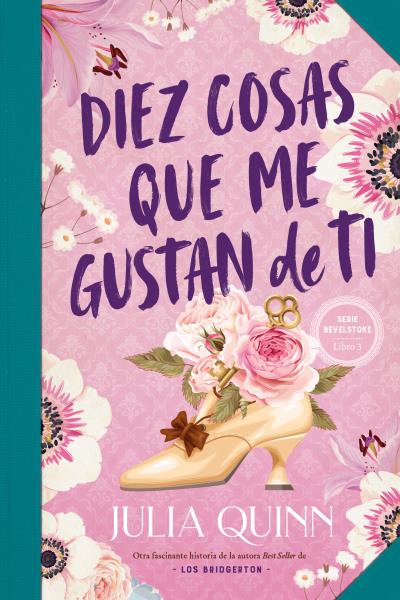
En Español
Not ready to order yours? Check out this story's overview. Read the excerpt. Listen to a bit on audio. Find out more about the series. There’s so much to love!
Awards & Achievements
- Top Ten for Ten Things! Ten Things I Love About You was named one of the Ten Best Romances of 2010 by the editors at Amazon.com. This is the TENTH time one of Julia Quinn's books has appeared on this list
-
 Ten Things I Love About You debuted at #7 on the New York Times mass market paperback list. Thanks to everyone who made it a bestseller, and don’t miss JQ's ode to her readers.
Ten Things I Love About You debuted at #7 on the New York Times mass market paperback list. Thanks to everyone who made it a bestseller, and don’t miss JQ's ode to her readers. - Five Weeks on the USA Today bestseller list.
